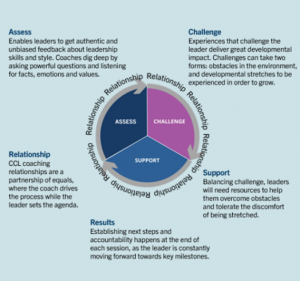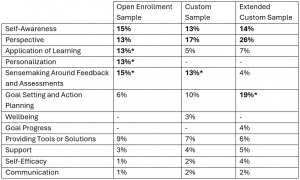Exploring the Unique Value of Coaching in Leadership Development Programs What Stands Out from Leaders’ Experiences?
By: Katelyn McCoy and Caroline DeStefano
In this blog, we take a deep dive into our data on the benefits of integrated coaching in CCL’s leadership development programs. Unlike coaching offered as a stand-alone service (like executive coaching), integrated coaching supports and enhances the other activities that may be included as part of a program or learning initiative – like teaching leadership content and activity-based learning.
We, too, were curious to better understand how integrated coaching provides value, and we explored that question by analyzing leaders’ reflections about its impact.
Integrated Coaching – A Key Ingredient
At CCL, we employ integrated coaching in our core leadership training programs (what we call “open enrollment”) and programs customized to meet individual clients’ needs (what we call “custom”) for two reasons:
- To help leaders reflect on, internalize, and apply what they’ve learned in the program and their assessment results.
- To support leaders through the process of identifying and pursuing goals, driven by their personal leadership challenges.
Integrated coaching aims to help participants progress from their current leadership practices to more effective future practices. Through this lens, it provides additional support for leaders by helping them find opportunities to apply what they’ve learned in their leadership development program, a key factor in ensuring long-term impact.
CCL’s approach to integrated coaching draws from scientific theories that suggest learning sticks when it’s reinforced by experience.[i] It also draws from goal-setting theory, which suggests that receiving support in pursuing concrete goals often leads to better long-term outcomes.[ii] We apply these theories in our coaching framework – the RACSR model – in which the coach and participant engage in a developmental process that involves relationship-building (R), assessment (A), challenge (C), support (S), and a focus on achieving desired results (R).[iii]
CCL’s RACSR Model

What Do Leaders Have to Say About Integrated Coaching?
RACSR is intended to create an effective coaching experience across all our leadership development offerings. In this blog, we go beyond understanding whether leaders are generally satisfied with coaching (because many of them are) to investigate why effective one-on-one coaching has such an impact on leaders’ development. To do this, we analyzed leaders’ open-ended responses to a prompt in our post-program feedback surveys that asks them to describe the impact coaching had in their own words.
These reflection-style responses are really where the richness of their coaching experience comes to life, and they’re key for centering customer voice in the evaluation process, which requires us to go beyond satisfaction-style rating questions to understand why leaders are satisfied and how that relates to their developmental outcomes.
Because one-on-one coaching is personalized for each leader, we first saw that many responses spoke to the individual leader’s experience – either the challenges coaching helped them address or specific lessons it helped them internalize. We aimed to investigate what commonalities might exist across the integrated coaching experience.
With over 6,000 responses from the last three years, we knew it would be an overwhelming task to synthesize meaningful themes. Given recent advances in AI, we decided to test an unconventional approach to thematically code leaders’ comments.

Leveraging OpenAI’s ChatGPT for Thematic Coding
We engaged Azure OpenAI’s GPT-4 model alongside human coders to assist with our thematic coding analysis. This involved assigning thematic codes to leader responses to the prompt “Please comment on how coaching impacted your leadership development experience.” across three contexts where CCL routinely provides integrated coaching.
In an associated Research Insights Paper, we explore how our research team systematically compared the AI and human-generated coding before engaging in sensemaking around the resulting themes. There, we also share what we learned about using AI for this type of task. For the sake of this blog, we’ll move forward to share what we ultimately learned about the impact of coaching from our analysis of leaders’ responses.

The Unique Value of Integrated Coaching in Leadership Development Programs
We explored leaders’ responses across three different contexts representative of CCL’s service offerings. This resulted in the following three samples.
- Open Enrollment Sample: This sample represents one-on-one coaching that takes place during our individual leadership training programs (what we call “open enrollment”). These programs are our most standardized training options made to accommodate individual leaders from any industry.
- Custom Sample: This sample represents one-on-one coaching that takes place during a program tailored to an organization’s unique context, challenges, and culture (what we call “custom”). These programs are targeted to meet a particular need within an organization, involving custom-designed content and activities.
- Extended Custom Sample: This sample represents one-on-one coaching included in a custom program that takes place at a different time from the other program activities. Although we could have included these responses in the Custom Sample, we separated the two because of the high likelihood that leaders in this sample engaged in more sessions with their coach than in either of the previous samples.
We uncovered what leaders’ comments most often mentioned about the impact of integrated coaching by analyzing the prevalence of a common set of themes within and across each sample. Prevalent themes appeared in over 10% of comments within a particular sample (bolded in the table below). Some themes were more prevalent in one or two samples than the other(s). We interpreted themes with a prevalence rate one standard deviation (~6%) higher than the prevalence in other samples as uniquely prevalent (bolded and starred* in the table below). These prevalence rates help us draw conclusions about the most salient benefit of coaching for the leaders included in each sample.

Note: Cells containing no number (-) reflect themes that were only detected in one sample, not the other two.
Universal Themes
Based on our findings, self-awareness and perspective were consistently prevalent across all three samples. This tells us that regardless of the context, leaders tend to recognize the value of these outcomes as unique contributors of integrated coaching to the overall impact of the program.
Self-Awareness
Comments were assigned the theme “self-awareness” when the participant expressed that they’d gained insights into their own experience and behavior.
“I had a breakthrough in terms of understanding the types of situations where I do not show up at my best, and how that impacts me. So now I have a better understanding of how to respond to such situations.” – Participant Response
Through coaching, program participants can delve into powerful explorations around who they are, what drives their behavior, and what impact they want to have in their organization and the world. This aligns with research that demonstrates the importance of coaching in helping leaders recognize their own strengths, weaknesses, behavior patterns, and how they are perceived by others.[i]
Perspective
Comments were assigned the theme “perspective” when it was clear that the coach helped the leader see new, objective viewpoints on their unique situation or challenges.
“[My coach] was AMAZING at helping me learn my strengths and weaknesses. He also understood my military side and gaining a better perspective of how I can take the strengths of my military side and use them on the civilian side. He really challenged me to think of my leadership as one style and not two separate ones.”– Participant Response
Our findings suggest that leaders often experience an expanded perspective through integrated coaching. This could be related to their personal qualities, unique situations, or leadership journey. Effective coaches can bring an unbiased perspective and help leaders reframe challenges to find more effective ways to navigate them.[ii]
Uniquely Prevalent Themes
Aside from self-awareness and perspective, several themes were highly prevalent in one or two samples rather than all three.
Application of Learning & Personalization
The two themes, “application of learning” and “personalization” were uniquely prevalent in our Open Enrollment Sample. Comments were assigned the theme “application of learning” when leaders mentioned that their coach helped them understand the connection between training materials and their day-to-day roles, leading to an enhanced ability to apply what they learned in-program. Comments were assigned to the theme of “personalization” when participants mentioned that the coaching offered a unique opportunity for them to receive personalized attention and align what they were learning in-program with their own experiences.
“[Coaching] helped me put a framework and plan together to bring back to my job. So much was covered this week, and my fear is that it will be lost, or that I would struggle to put it to good and practical use. [My coach] has helped me to better understand all of the feedback and develop a plan to bring back with me.” – Participant Response
CCL’s core leadership training (open enrollment) programs cater to a wide range of attendees across industries, organizations, and regions. In this context, leaders may see their coaching sessions as a highly personalized development activity in comparison to their time in the classroom with other program participants. Coaching in these types of programs also involves more targeted conversations about applying the program content beyond the classroom. Together, these aspects of coaching help leaders understand how the skills they acquired can be applied in their own roles and identify realistic development goals that can lead to greater long-term outcomes aided by learning transfer.[iii]
Sensemaking Around Feedback and Assessments
The theme “sensemaking around feedback and assessments” appeared most frequently in both the Open Enrollment and Custom Samples. Participant comments were assigned this theme when the leader mentioned the value of their coach helping them make sense of their assessment results.
“Just by knowing that you are going to talk with someone about the results of your assessments, forces you to try to make sense of them. If nothing else, this is valuable. However, [my coach] had good insight on specific points of my results and through conversation helped me realize areas the focus on that I would not have otherwise know.” – Participant Response
In following our RACSR model, assessment feedback tends to be one of the first activities our coaches engage in, while a more in-depth discussion about participants’ goals may come later (as reflected in our next insight). Because these two samples came from surveys provided within the same timeframe as the rest of the program activities, we believe the assessment feedback process was likely more salient as an impactful part of their leadership development experience than it might have been for the Extended Custom Sample. Participants emphasized the value of sensemaking in addition to the value of the assessments themselves. This suggests that participants were better able to synthesize the meaning behind their assessment results with the expert guidance of their coach, likely leading to a greater sense of self-awareness observed across all three samples.[iv]
Goal Setting/Action Planning
Highly represented across all samples but uniquely prevalent in our Extended Custom Sample, our final theme was “goal setting and action planning.” Comments were assigned to this theme when participants mentioned that their coach helped them set personal and professional goals and identify specific, actionable steps to achieve them.
“[My coach] encouraged me to look at some long-standing issues deeper and use those to build my development goals. I left with a clear set of action items, and feeling like I can make progress towards my goals.” – Participant Response
Although this theme seemed to be an important aspect of coaching across all three samples, the Extended Custom Sample likely included more leaders who experienced longer or more in-depth coaching engagements, wherein pursuing goals became more salient than the previously mentioned sensemaking process. Effective goal setting is a key part of coaching that, according to goal-setting theory, tends to be most related to sustained behavior change.[v] Research has also shown that leaders who receive extended or prolonged post-program coaching support for achieving their developmental goals also experience greater long-term impact of their program[vi].
Key Takeaways
In this blog, we explored leaders’ comments about the unique benefits of integrated coaching to better understand how it may contribute to the long-term impact of leadership development initiatives. Across three different contexts where CCL offers integrated coaching, leaders cited self-awareness and perspective as unique factors contributing to impact, both of which are related to leaders’ deep development (or vertical development).
We also found that leaders’ comments emphasized the importance of applying the skills they learned, particularly in the context of more standardized leadership development programs. When the content of the program is made to appeal to a much broader audience, that one-on-one, personalized support may help leaders make the most of the time spent in the classroom by finding ways to apply what they learned in their individual roles.
Finally, we found that leaders recognized the usefulness of engaging in assessment for development and goal setting as key parts of the coaching process that contributed to the impact of their leadership development experience. Although leaders could engage in these activities without individualized attention from a coach, they pointed out the value of their coaches’ input and guidance, making sense of their assessment results and identifying clear goals, suggesting that integrated coaching brings value above and beyond the case without a coach.
As you’re planning your next leadership development initiative, don’t overlook the value of coaching to boost its impact in your organization.
Acknowledgements
We want to thank Tanner Landolt and Ezekiel Welsh, authors of our related Research Insights Paper and key team members for this research project. We also want to thank Sirish Srestha and Ramya Balakrishnan for sharing their data science expertise and providing key support in better understanding AI.
References
[i] Gurvis, J., McCauley, C., & Swofford, M. (2016). Putting experience at the center of talent management [White Paper]. Center for Creative Leadership. https://doi.org/10.35613/ccl.2018.1069
[ii] Locke, E. A., & Latham, G. P. (2019). The development of goal setting theory: A half century retrospective. Motivation Science, 5(2), 93–105. https://doi.org/10.1037/mot0000127
[iii] Stawiski, S., Sass, M., & Grunhaus Belzer, R. (2016). Building the case for executive coaching [White Paper]. Center for Creative Leadership. https://doi.org/10.35613/ccl.2016.1051
[iv] Passarelli, A. M., Moore, S., & Van Oosten, E. B. (2022). How leaders and their coaches describe outcomes of coaching for intentional change. Consulting Psychology Journal, 74(4), 329–346. https://doi.org/10.1037/cpb0000240
[v] Witherspoon, R. (2014). Double-loop coaching for leadership development. The Journal of Applied Behavioral Science 50(3), 261-283. https://doi.org/10.1177/0021886313510032
[vi] Johnson, S. K., Garrison, L. L., Hernez-Broome, G., Fleenor, J. W., & Steed, J. L. (2012). Go for the goal(s): Relationship between goal setting and transfer of training following leadership development. Academy of Management Learning & Education, 11(4), 555–569. https://doi.org/10.5465/amle.2010.0149
[vii] Luthans, F., & Peterson, S. J. (2003). 360 degree feedback with systematic coaching: Empirical analysis suggests a winning combination. Human Resource Management, 42(3), 243–256. https://doi.org/10.1002/hrm.10083
[viii] Locke, E. A., & Latham, G. P. (2002). Building a practically useful theory of goal setting and task motivation: A 35-year odyssey. American Psychologist, 9(57).
[ix] Sørensen, P. (2017). What research on learning transfer can teach about improving the impact of leadership-development initiatives. Consulting Psychology Journal: Practice and Research, 69(1), 47. https://doi.org/10.1037/cpb0000072

